Posted: October 16th, 2015 | 29 Comments »
What do we know about the old Zeitgeist Bookshop in Shanghai? And why would we want to know more? Well, the Zeitgeist Bookshop was operating from at least the late 1920s from premises near Soochow (Suzhou) Creek on 130 North Soochow Road (now Suzhou Road North).Or maybe it was somewhere else – the American Communist journal New Masses lists the store at 130 North Soochow, but The People’s Tribune, published by the China United Press in 1933 gives the address as Bubbling Well Road. Of course, what I don’t have but would like is a photograph which would settle the matter?
The Zeigeist was run by a German woman (though Rewi Alley in his autobiography says she was Dutch – but he was 90 when he wrote that!), Fraulein Irene E.I. Wiedemeyer (or Wedemeyer, or sometimes Weitemeyer) and her younger sister. At some point Frau Wiedemeyer married Wu Shao-kuo, a Chinese communist party member she had met in Germany some time around 1925, but always retained her German name. At some point it appears Frau Wiedemeyer studied at the Sun Yat-sen University in Moscow around 1926-27. She was, according to the Shanghai Municipal Police, a member of the Noulens Defense Committee (a notorious comunist spy case) and the Society of Friends of the U. S. S. R. in Shanghai. As to what else we know about Wiedemeyer? she was a German Jew with, according to Ruth Price, a biographer of Agnes Smedley, “freckled skin, milk-blue eyes and unmanageable red hair.” (though how she knows this is not entirely clear as the source isn’t footnoted).
Why should we be interested? The Zeitgeist was generally regarded throughout the late 1920s and early 1930s as a “clearing house” for communist information. Frau Wiedemeyer had links to the Chinese communist movement as well as to the NKVD (later KGB) operating in the city during the decade through her close friendship with Mrs VN Sotov, the wife of the Head of the Russian News Agency TASS in Shanghai. As well as TASS/Comintern agents and Chinese communists, Hotsumi Ozaki, the Japanese informant in the Soviet spy ring connected to Richard Sorge frequented the shop. It was at the Zeitgeist that Ozaki met Agnes Smedley, the American communist. Sorge himself also made contact with Smedley at the Zeitgeist while Roger Hollis (later Mi5 director and suspected Soviet spy), American communist Harold Isaacs, the South African Trostskyist Frank Glass (who of course fell out with the Stalinists running the bookshop) and George Hatem (Ma Haide), the American doctor turned communist, also visited.
The Zeitgeist was in fact the Shanghai branch of the Zeitgeist Buchhandlung group of Berlin, a chain of shops that distributed pro-Soviet books and materials. Funding for the chain came from the coffers of the International Union of Revolutionary Writers in Moscow, a communist front organisation, and was arranged by the Comintern’s Willi Muenzenberg. The shop seems to have remained in operation until about 1933 or slightly long after which the Nazis in Germany cut off her contacts with the German Communist Party who supplied her with materials and books.
What did the bookshop look like? we only really have one or two descriptions and these are that it was about twelve by eighteen feet in size and poorly lit. Despite this rather small location the Zeitgeist did sell books in at least three languages (German, Chinese, Russian) and have the occasional art exhibition – for instance, an exhibition of new German graphic art in 1932.
Frau Weidemeyer was not to be put off. She visited Europe in late 1933 and returned to Shanghai in September 1934 to open a new bookshop in a new location, 410 Szechuan Road, this time as the Shanghai representative of the International Publishers company, an affiliate of the American Communist Party.
Posted: October 15th, 2015 | No Comments »
I recently came across Tong Lam’s 2011 book A Passion for Facts: Social Surveys and the Construction of the Chinese Nation-State, 1900–1949. It’s a good read and one thing that struck me was the section on that old stat that’s always repeated ad nauseum – China’s population of 400 million in the 1930s. It’s perhaps best remembered now as a stat from the continued interest and frequent re-publishings of Carl Crow’s Four Hundred Million Customers (1937) as well as the Joris Ivan’s pro-Chinese documentary The 400 Million (1939). But, even by the 1930s, the stat had been around for a long time – Tong Lam quotes the American diplomat John Watson Foster using it in 1903. It certainly seems to have been the given number for at least half a century. However, China did not have anything approaching an accurate population census during that period and, as is noted, various other estimates differed from the 400 million by several hundred million either way. 400 million could stand for any view of China you wanted – a massive potential enemy, market, drain on resources, opportunity or threat, depending on your outlook.
The Chinese too, both late Qing and Republicans – adopted the 400 million estimate – and again for a number of reasons – potential strength, potential weakness, untapped resources or possible crippling problems. Tong Lam calls the 400 million an “enumerative imaginery”, a “political trope” of various uses. But nobody has a better stat!
So we’re left with 400 million and it’s unlikely now that, in the absence of any useful census data from the period (to my knowledge), historical demographers can do much to improve on that. The 400 million stands!
Of course there had been earlier numbers – but these appear no less reliable. Around the middle of the nineteenth century many western sources quote the population at around 175 million to 200 million. However, the 400 million stat was being bandied about even then – the Rev. Spencer of Rockford, Ill, who’d been a missionary in China, told audiences in America in 1842 of the 400 million Chinese and an 1850 source quotes 450 million – it’s impossible the Chinese population didn’t change in a century!
After 1949 the estimates start to go up – Red Scare! possibly. Perhaps we might expect a dip or at least statis due to the Second World War. In 1950 most reports are talking about 500 million – that’s at least another 100 million between 1939 and 1949 with seven years of brutal and murderous war in between. These figures are important because almost immediately in the 1950s Mao, urged on by the Soviets, starts talking of the need to cut the population by 100 million – i.e. back to 400 million.
The Red Cross had a go at estimating the figures and found half a dozen surveys between 1950 and 1953 – they settled on an amazingly specific 482, 869, 687. The Chinese Red Army argued they were wrong and cited an equally amazingly specific stat of 492,530,000. The government said both were wrong and its was a rounded up 600 million, and growing at 20 million per year. Fast forward to 1960 and Beijing is now saying 650 million and predicting 900 million by 1980. 1965 sees 680-700 million commonly reported. By 1970 the 700 million stat is the most commonly used in newspapers. 1975 and Beijing says “almost 800 million”; 1980 and it’s 900 million and by 1985 the magic “billion” starts creeping in, as does the One-Child Policy.
That’s enough stats for me…from 400 million in the late 1930s to a billion by the 1980s – but perhaps more or less than 400 million in the 1930s and perhaps more or less than a billion by the mid-1980s!! I’m off to a dark room with a cold glass of water to calm down now!
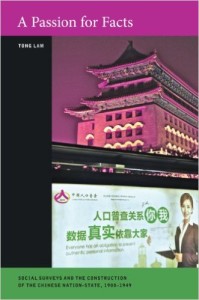
Posted: October 14th, 2015 | No Comments »
I’ve blogged about the once famous Shanghai Emporium, a Chinese food store that was adjacent to the Shanghai restaurant on Soho’s Greek Street (here, here and here). Here’s a photograph taken inside the Pillars of Hercules pub (which is still going strong) from 24th November 1933. The Pillars of Hercules pub is itself is on Greek Street (see below) and the small alleyway that runs up its side is Manette Street (named after the Dickens character in Tale of Two Cities) that cuts through to Charing Cross Road by the side of the old Foyles bookshop. In this picture you can see out the side window, facing north, onto the Manette Street cut through and see the street signage for the old Shanghai Emporium was the building immediately to the north of the pub, i.e. up towards Soho Square. And so, as the gent in the picture is obviously saying, “cheers”…
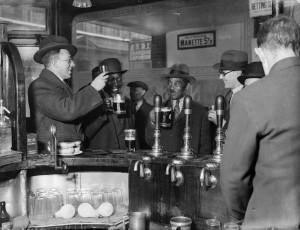
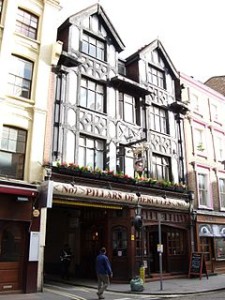
Posted: October 12th, 2015 | No Comments »
Alexander Cordell is now best remembered for his series of books about the industrialisation of Wales, Rape of the Fair Country probably being the best remembered of his Welsh novels. But The Bright Cantonese, retitled The Deadly Eurasian for some subsequent editions and published by Victor Gollancz in 1967, is the story of Mei Kayling, a half-British, half-Chinese member of the Red Guard who is, in fact, a secret agent. It’s a product of its time following a heroic Red Guard trying to thwart a nuclear attack on China by the USA.
Though noted mostly for his Welsh writing, Cordell spent much of his youth in the Far East, particularly in Hong Kong, and had been born in Ceylon. He died in 1997 and his obituary in The Independent carried a good line, “Alexander Cordell was a popular writer whose novels were read by people who do not usually read novels.” He wrote two other novels located in China – The Sinews of Love (1965), which is set in Hong Kong, and The Dream and the Destiny (1975), about the Long March of Mao Tse-tung.
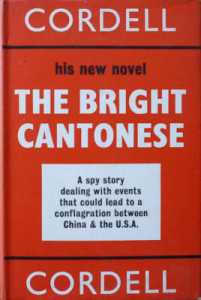
Posted: October 12th, 2015 | No Comments »
The 1930s equivalent of an internet block – in 1930 the Shanghai Evening Post (founded, published and initially edited by Carl Crow) annoyed the KMT Nationalist government censors in some way (a fairly common event) – hence it lost its mailing privileges and so could not be sent in the Chinese mail. The ban appears to have lasted some months…..

Posted: October 11th, 2015 | No Comments »
Previously on Canton Drug Runners of 1939… Chung Lei is now in the custody of the SFPD and letters in his hand have revealed the plan to use a concession at the Golden Gate Expo in San Francisco as a front for opium dealing. His accomplice in smuggling the drugs has been revealed as neither an innocent party nor Chung’s wife, but in fact his mistress and mother of three of his children. The two remain in jail awaiting the judge’s final verdict….
On January 28th 1939 Judge Michael J. Roche presided over the trial of accused Canton drug “runners” Chung Lei and Leung Ying (or Yin) Lin (Leung Ting Lim in some papers who seemed to be having awful trouble getting her name right!), now referred to in the local papers as the “broke banker” and the “comely concubine”. He handed down five year sentences to both in federal prison for drug smuggling after which they were to be deported back to China. “Petite” Miss Leung broke down into tears as the judge pronounced.
Throughout the trial Miss Leung had had no counsel – she spoke through an interpreter and Chung Lei offered her no help with her defence. However, he had tried to protect himself in court. Chung was represented by James Whalen who could not muster much of a defence except that Chung was desperate after having his business in Canton destroyed by the Japanese invasion of China. While the Judge accepted that Chung was a victim of terrible circumstances due to the Japanese invasion of China it did not excuse his opium smuggling into the United States. Annoyed that Chung was trying to get a reduced sentence by claiming distress due to the war in China, Miss Leung told the court that their plan to import drugs into America under cover of the fireworks and candy concession at the Golden Gate International Expo was purely an attempt to pay off gambling debts and recoup Chung’s lost fortune. Chung’s attempted defence fell apart – he was in debt to criminal gangs and, in an attempt to extricate himself, had attempted to both smuggle opium into America and set up a sales operation at the Golden Gate Expo!
Chung it seems was indeed desperate – he now admitted that, on his earlier visit in July 1938, he had smuggled in a trunk of opium to Seattle when he had visited to secure the Golden Gate Expo concession. As mitigating circumstances he claimed that he had a wife and a further eight children back in Canton depending on him. The Judge was not impressed.
And so they were sent down….5 years each and then deportation…the Golden Gate Expo drug ring was shut down before it had managed to even start.

Chung Lei – the “broke banker of Canton”
Posted: October 10th, 2015 | No Comments »
Previously on Canton Drug Runners of 1939….the mysterious brocaded gown and fur coat adorned Miss Seto Gin sits in a San Francisco jail on a charge of importing 49 cans of raw opium to the United States; a man travelling with her, Chung Lei, has slipped through customs and is on the run in California. The SFPD, who suspect Chung of being the “kingpin” of a Canton drug cartel, have launched a massive manhunt to get Chung Lei back…
Chung stayed free for most of January 1939 before turning himself in to federal authorities on the 25th of the month. He had been lying low in a local lodging house in San Francisco. By that time a lot had happened. Mrs Seto Gin/Mrs Chung Lei was in the city jail but, it had been ascertained by contacting the British police in Hong Kong, she was actually a Miss Yeung Yin Lin, aka Violet Wong, 21, 22 or 24-years of age (the reports conflict though all are roughly a decade younger than originally reported!) of Hong Kong. Gin/Chung/Yeung/Wong, whoever she was really, and Chung Lei were now incarcerated at the San Francisco City Prison. The SFPD grilled them to uncover the cartel.
Slowly the story was pieced together and eventually told by U.S. Attorney Sydney P. Murman to a Federal Grand Jury. It was quite amazing….
Chung Lei and Violet Wong were both members of prominent Canton (Guangzhou) families. Chung had graduated from New York University, then worked as a high school principle in Canton before becoming the manager of a Canton bank. Violet Wong, though only 21 (or maybe 22 or maybe 24), had already borne him three children. But she was not his wife, despite declaring herself as such on the ship passenger records so as to share a cabin – Chung’s wife was still living in Canton. Wong was Chung’s “second wife” or, as the newspapers enjoyed reporting, his “concubine”.
The Japanese invasion of southern China in 1937/1938 had ruined Chung’s banking business and he had drifted down to British-controlled Hong Kong. However, he had been unable to re-establish himself there and had fallen on seriously hard times. He began gambling in Hong Kong and Macao and ended up owing rather a large debt to a local Canton gambling concern who ran casinos in both places and who’d lent heavily to him. They suggested he could work off the debt by smuggling drugs for them.
In July 1938 Chung had arrived on a still existing student visa in San Francisco to arrange to operate a concession at the upcoming San Francisco Golden Gate International Exposition to be held on Treasure Island. As well as providing fireworks Chung wanted to operate a booth selling lace and Oriental confectionery. Miss Wong was to be hired as a demonstrator at the booth. The real plan though was to use the concession to smuggle in opium in boxes of fireworks and tins of candies and then deal the drugs during the Expo. However, while in San Francisco, Chung ran out of money and wrote a letter to his criminal contacts back in Hong Kong. Copies of the letters were found in Wong’s luggage implicating him in the proposed drug dealing operation. Chung has used Violet Wong to smuggle opium to America as candies and fireworks, opium she was then to sell at the Expo – at the lodging house where Chung had been hiding out was found another trunk with a false bottom containing yet more opium.
The jury returned two counts of smuggling against the pair and bail was set at US$10,000.
Tomorrow – the final installment – The Verdict…
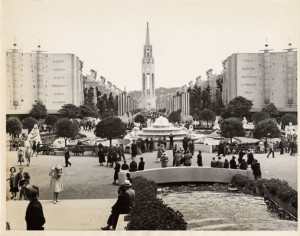
San Francisco’s Golden Gate International Expo, 1939
Posted: October 9th, 2015 | No Comments »
Following on from yesterday’s post on two Hong Kong drug mules arrested at San Francisco in 1939…
Mrs Seto Gin was originally arrested disembarking the President Coolidge from Hong Kong by Mr M.J. Jordan of the US Customs Service, a man who specialised in spotting drugs mules arriving from Far Eastern ports to America. Gin was transported to a jail cell and left overnight, but not before being fingerprinted by Matt Savasta, head of the San Francisco police check and bank detail.
The next day she appeared before U.S. Commissioner E.E. Williams where it was established that the “comely” Miss Gin was indeed Mrs Chung Lei. She further insisted that she was actually from Hong Kong and required an interpreter to translate. The U.S. Attorneys passed her case to the Federal Grand Jury and her bail was set at US$20,000. The defendant appeared in court still wearing the “lustrous brocaded Chinese gown” she was arrested in – but now with a “rich fur coat” too.
Gin was held incommunicado. The San Francisco Police stated that they believed she was a “runner” for a “huge drug syndicate” operating out of Shanghai and Hong Kong. In police custody Mrs Gin/Chung found time to redo her make-up in her hand mirror (see below).
Now the SFPD wanted Chung Lei, described as being 37-years-of-age. A man hunt was launched for him…and he was named as the Kingpin of the drug smuggling operation…
Tomorrow….the Hunt for Chung and the real plot revealed…










